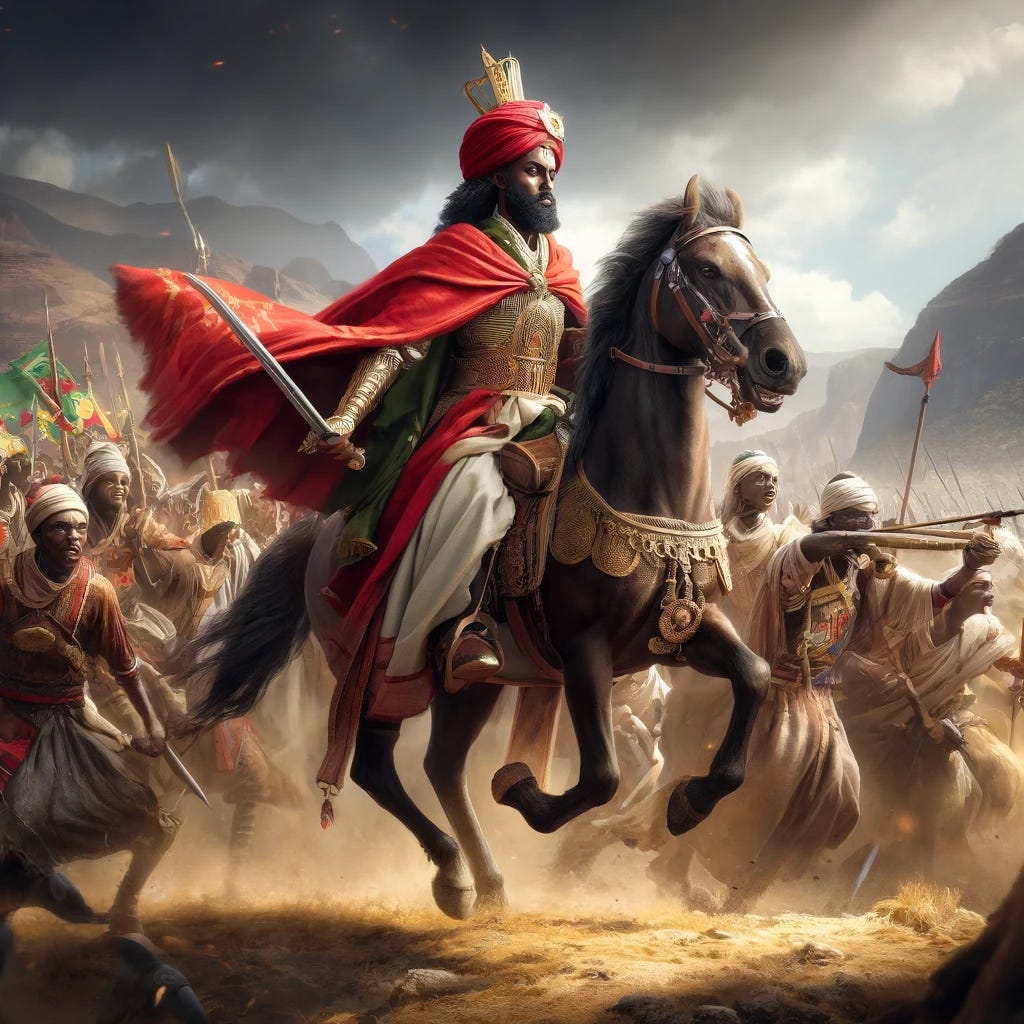The Incredible Story of Menelik II who Fought the Colonial Empire and Won
The courageous exploits of the Ethiopian Emperor who inspired the Pan-African movement
Hey Alkebulanians!
I trust you are all well and the year has been productive for you.
Note: I am purging my mailing list of readers who have not opened any of the newsletters or podcast episodes. If you want to continue receiving ALKEBULAN make sure the email is added to your safe senders list so that it doesn’t go to spam. The Merc
In continuation of my Kings Of Africa series, I have a real treat for you. When one imagines the colonial scramble for Africa in the late 19th century, a continent torn apart by European imperialism comes to mind. Many of you know that there was one African nation that was never colonised by Europeans. That country was Ethiopia. However, do you know the story of the king responsible for that feat and how he did it? No? Neither did I till I continued on my discovery of TRUE African History.
Oh, by the way if you haven’t already, check out my True History Of Africa Challenge. The waitlist of supporters is growing and you can be part of something historic for the African community!
Okay, back to our ancestor Menelik!
Everyone Wanted A Piece Of Africa
European powers aggressively carved out territories, imposing foreign rule on African kingdoms and societies. However, amidst this wave of conquest, a remarkable African ruler emerged who not only defended his nation's sovereignty but fundamentally altered the course of African history.
This man was Emperor Menelik II of Ethiopia—a visionary leader, a skilled diplomat, and a military strategist whose impact continues to resonate in Africa. This man inspired the Pan-African movement we all hold dear and what is crazy is few people in the black and African community know who he is.
PAY ATTENTION
The Man Behind the Name: Who Was Menelik II?
Born Sahle Maryam in 1844 in the region of Shewa, the young prince was thrust into a world of political intrigue and power struggles. The grandson of King Sahle Selassie of Shewa, he was captured at age 11 by Emperor Tewodros II, who sought to unify Ethiopia by forcibly bringing regional kings under his rule. Despite being held hostage for over a decade, Menelik bided his time, carefully observing the volatile political landscape and honing his diplomatic and strategic skills.
If you read my article on Sundiata Keita of Mali earlier in the Kings Of Africa series, you will know this habit of capturing and exiling rivals to the throne was rampant throughout ancient Africa.
When Emperor Tewodros II fell in 1868, Menelik escaped and returned to Shewa, where he claimed his hereditary title of king. His ambition, however, extended far beyond regional rule. Menelik had a vision to unite the diverse peoples of Ethiopia under a single crown and transform the nation into a formidable power.
Over the next two decades, he expanded his territories through military campaigns, strategic alliances, and shrewd diplomacy. By 1889, following the death of Emperor Yohannes IV, Menelik was crowned emperor of Ethiopia, taking the throne at a crucial juncture in African history.
The Battle of Adwa: Africa's Resounding Victory Against Colonialism
To understand Menelik II's significance, one must grasp the magnitude of the Battle of Adwa in 1896. During the late 19th century, Ethiopia found itself encircled by colonial powers—France, Britain, and Italy—all of whom sought to exert influence over the region. Italy, in particular, harboured ambitions of turning Ethiopia into an Italian protectorate, using the Treaty of Wuchale as a tool for their objectives.
This treaty is where the trickery of the colonisers revealed itself to the emperor.
The treaty, signed in 1889, had two versions—one in Amharic and one in Italian. The Amharic version stated that Ethiopia could conduct its foreign affairs through Italy if it chose, while the Italian version stipulated that Ethiopia must do so, effectively making it a protectorate. When Menelik discovered the deception, he repudiated the treaty and began mobilizing for war.
Does this sound familiar?
Do you remember what the British tried to do to Oba Ovonramwen with his treaty?
Or what George Goldie did to the Chiefs in what is now Nigeria when he wanted to control the Palm Oil?
Check out my videos ‘Oba Ovonramwen and the Stolen Treasures Of Benin’ and ‘True Origin Of Nigeria’ if you haven’t seen them to give you the full context of this recurring colonial method of control in Africa.
A Battle For The Ages
The ensuing Battle of Adwa in 1896 was a monumental clash between Menelik's forces and the Italian army. Menelik, alongside his wife, Empress Taytu Betul, mobilized an army from all corners of Ethiopia, uniting diverse ethnic groups against a common enemy.
Does this remind of something happening now?
Sahel Alliance? Ahem…sorry to interrupt.
On March 1, 1896, the Ethiopian forces decisively defeated the Italians, marking a historic victory. The Battle of Adwa not only preserved Ethiopia's independence but also shattered the myth of European invincibility.
It was the first time an African nation decisively defeated a European colonial power in battle, inspiring anti-colonial movements across the continent and beyond. This was how the Pan-African movement started, but more on that later.
Visionary Leadership and Nation-Building
While Menelik II is most celebrated for his military triumph at Adwa, his contributions to Ethiopia's modernization and nation-building are equally significant. Recognizing that Ethiopia's future lay in embracing certain elements of modernity, Menelik embarked on an ambitious program of development that transformed the nation’s infrastructure, economy, and governance.
Under Menelik's reign, Ethiopia saw the introduction of the first telephone and telegraph systems, the establishment of modern schools, and the construction of hospitals. He initiated the building of roads and bridges to connect previously isolated regions, fostering economic integration and strengthening national unity.
Perhaps most famously, he spearheaded the construction of the Djibouti-Addis Ababa railway, a monumental project that linked Ethiopia’s capital with the coast, facilitating trade and enhancing the country’s strategic importance.
Menelik also demonstrated remarkable diplomatic acumen. He skillfully balanced relationships with competing European powers, leveraging their rivalries to secure weapons, technology, and recognition for Ethiopia.
By securing arms from Russia, France, and Britain, Menelik ensured that Ethiopia remained militarily capable of defending its sovereignty. His strategic use of diplomacy ensured that Ethiopia was treated as an equal by global powers, not merely as another target for exploitation.
This was a masterclass because he used the same divide and conquer tactics on European nations that they used on Africa. He basically made deals with nations who hated each other and wanted Ethiopia to triumph as a means to an end.
What’s really cool is he did this with all of them so that, by the end, Menelik had Europe in the palm of his hands. This is why no one tried to help Italy in their fight against Menelik. They were all doing good business with him and they were no fans of the Italians.
Bravo Menelik you sneaky Emperor you! Bravo!
A Legacy of Unity and Sovereignty
Menelik II's leadership was characterized by his commitment to the principle of unity. In a country as diverse as Ethiopia—home to a vast array of languages, religions, and ethnic groups—maintaining cohesion was a formidable challenge. Menelik understood this and pursued a policy of inclusivity, integrating various regions into his empire through negotiation, marriage alliances, and, when necessary, military conquest. Despite the complexities, Menelik managed to create a sense of national identity that transcended regional differences, laying the foundation for modern Ethiopia.
Now I know I’ve been praising Menelik II as we should. However, no one is perfect and he had his share of controversy.
His expansion campaigns, particularly in southern and western Ethiopia, were marked by violent conflicts and the subjugation of local populations.
Critics argue that these campaigns were a form of internal colonization, imposing central authority over diverse ethnic groups when he was consolidating them for his fight against Europe and his vision for an Ethiopian empire.
The legacy of these conquests continues to influence Ethiopian politics, where questions of ethnic autonomy and federalism remain deeply contentious.
The Lion of Judah: Symbol of African Resistance
Beyond Ethiopia, Menelik II’s victory at Adwa resonated across Africa and the African diaspora. For colonized peoples across the continent, Ethiopia became a symbol of resistance and hope.
Menelik’s defiance of European colonialism emboldened nationalist movements, inspiring leaders like Kwame Nkrumah, Haile Selassie, and Marcus Garvey, who often invoked Ethiopia as a beacon of African dignity and sovereignty.
Menelik’s influence even extended to the African American community, where Ethiopia was seen as a symbol of black pride and resilience.
The “Back to Africa” movement, led by figures like Garvey, often looked to Ethiopia as a land of ancestral freedom, untainted by European subjugation. The symbolism of Adwa and Menelik II's leadership left an indelible mark on Pan-Africanism and anti-colonial thought.
Menelik II's Enduring Relevance
Menelik II passed away in 1913, leaving behind a legacy that is both celebrated and debated. His reign was a pivotal chapter in African history, demonstrating that African agency and leadership could successfully challenge European imperialism.
Ethiopia, under Menelik’s rule, showed that it was possible to navigate the treacherous waters of geopolitics while retaining cultural sovereignty and national pride. Today, Menelik II is revered as one of the most significant figures in African history. His story challenges the simplistic narratives of Africa as merely a passive victim during the colonial period.
Instead, Menelik’s life and reign highlight the complexities of African resistance, the importance of strategic diplomacy, and the power of visionary leadership in shaping a nation’s destiny.
He changed Africa and gave us a vision of freedom. True freedom.
He was David, he fought Goliath and won not only with brute force but with intelligence.
Now you know his name.
MENELIK II TRUE KINGS OF AFRICA MUG!
Now Available in The Alkebulan Shop









